Top CRM Integrations for AI-Driven Email Personalization
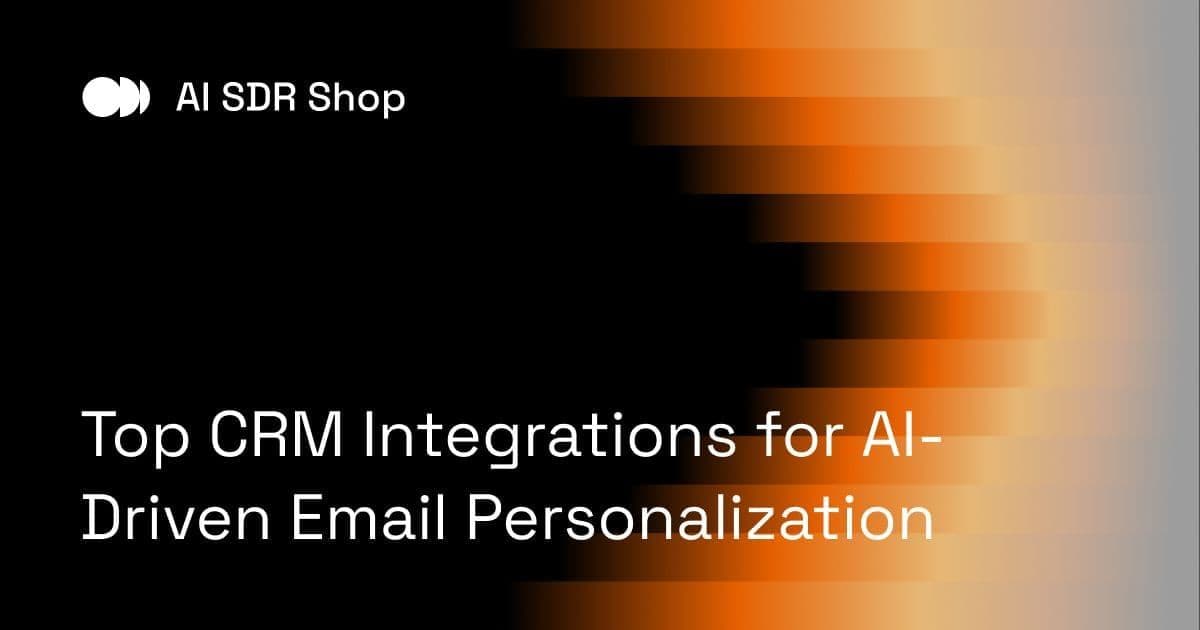
Top CRM Integrations for AI-Driven Email Personalization
AI-powered email personalization helps businesses craft tailored messages that resonate with individual customers. By leveraging CRM integrations, companies can automate email campaigns, track engagement, and deliver dynamic content like personalized subject lines and product recommendations. Here's what you need to know:
Key Features to Look For: Behavioral triggers, hyper-segmentation, predictive analytics, and real-time personalization.
Top CRM Options:
HubSpot CRM: Free tier available; great for small to mid-sized businesses.
Salesforce: Advanced AI tools for large enterprises; starts at $1,250/month.
Microsoft Dynamics 365: Integrates with Microsoft tools; pricing starts at $95/month per user.
Zoho CRM: Budget-friendly with AI tools; plans start at $14/month per user.
Mailchimp: Ideal for e-commerce; plans start at $20/month.
Pipedrive: Sales-focused with AI insights; starts at $21.90/month per user.
Harmonix AI: Enhances existing CRMs with AI-driven email content.
Quick Tip: Match your CRM to your business size, budget, and tech ecosystem. For research, check out AI SDR Shop, a free directory of AI sales tools.
Using AI and CRM Automation to Create Personalized Micro Campaigns
::: @iframe https://www.youtube.com/embed/FPCgZuhn_yM :::
How to Choose CRM Integrations for AI Email Personalization
Picking the right CRM integration for AI-powered email personalization isn’t just about short-term gains - it’s a choice that can shape your customer relationships for years to come. Here’s a breakdown of the key factors to help you make an informed decision.
Personalization Features
Personalization goes beyond adding a recipient’s name to an email. Advanced dynamic content adjusts elements like subject lines, product recommendations, and call-to-action buttons based on individual profiles. This means each email feels like it was designed specifically for the recipient.
Behavioral triggers are another must-have. These features track actions like website visits, email opens, or purchase history to automatically send follow-up emails at just the right moment. Pair this with hyper-segmentation, which divides your audience into smaller, more precise groups based on both demographic and behavioral data, and you’ll ensure every segment gets content that resonates.
AI and Automation Features
AI and automation bring efficiency and precision to email campaigns. Many modern CRM integrations use AI to streamline the personalization process, saving time while improving results.
Features like predictive analytics can anticipate conversion opportunities, while real-time engines recommend relevant content for individual recipients. Some platforms even offer generative content tools, which automatically create tailored email copy for different audience segments. This keeps your messaging aligned with your brand while addressing the specific needs of your customers.
Integration and Compatibility
Your CRM integration needs to work seamlessly with your existing tools. Native integrations often offer the smoothest experience since they’re built to function together without extra setup.
Start by evaluating your CRM’s built-in capabilities and API functionality. If native options are limited, consider third-party API solutions that can bridge the gap. Look for integrations with detailed documentation, regular updates, and responsive technical support. It’s always a good idea to consult your CRM provider to ensure compatibility and explore the best integration options for your needs.
Privacy, Compliance, and Security
Handling customer data comes with serious responsibilities. Make sure your integration complies with privacy regulations, such as GDPR if applicable.
Look for robust security measures like encryption for data both at rest and in transit. It’s also important to choose tools that offer detailed permission controls and audit trails, ensuring transparency and accountability in how data is managed.
Pricing and Scalability
CRM integrations come with various pricing models, from flat fees to usage-based charges. As you compare options, think about how costs will evolve as your business grows. Some platforms charge based on the size of your database or offer tiered pricing as your personalization needs become more advanced.
Scalability isn’t just about costs. Your integration should be able to handle larger data volumes and increased customer interactions as your business expands. Don’t forget to factor in the total cost of ownership, including setup, training, and ongoing maintenance. A scalable and budget-friendly solution will ensure your CRM integration supports your strategy both now and in the future.
Best CRM Integrations for AI Email Personalization
Choosing the right CRM integration can turn your email campaigns into meaningful conversations that resonate with recipients. Here's a look at some of the best CRM options designed to elevate AI-driven email personalization.
AI SDR Shop
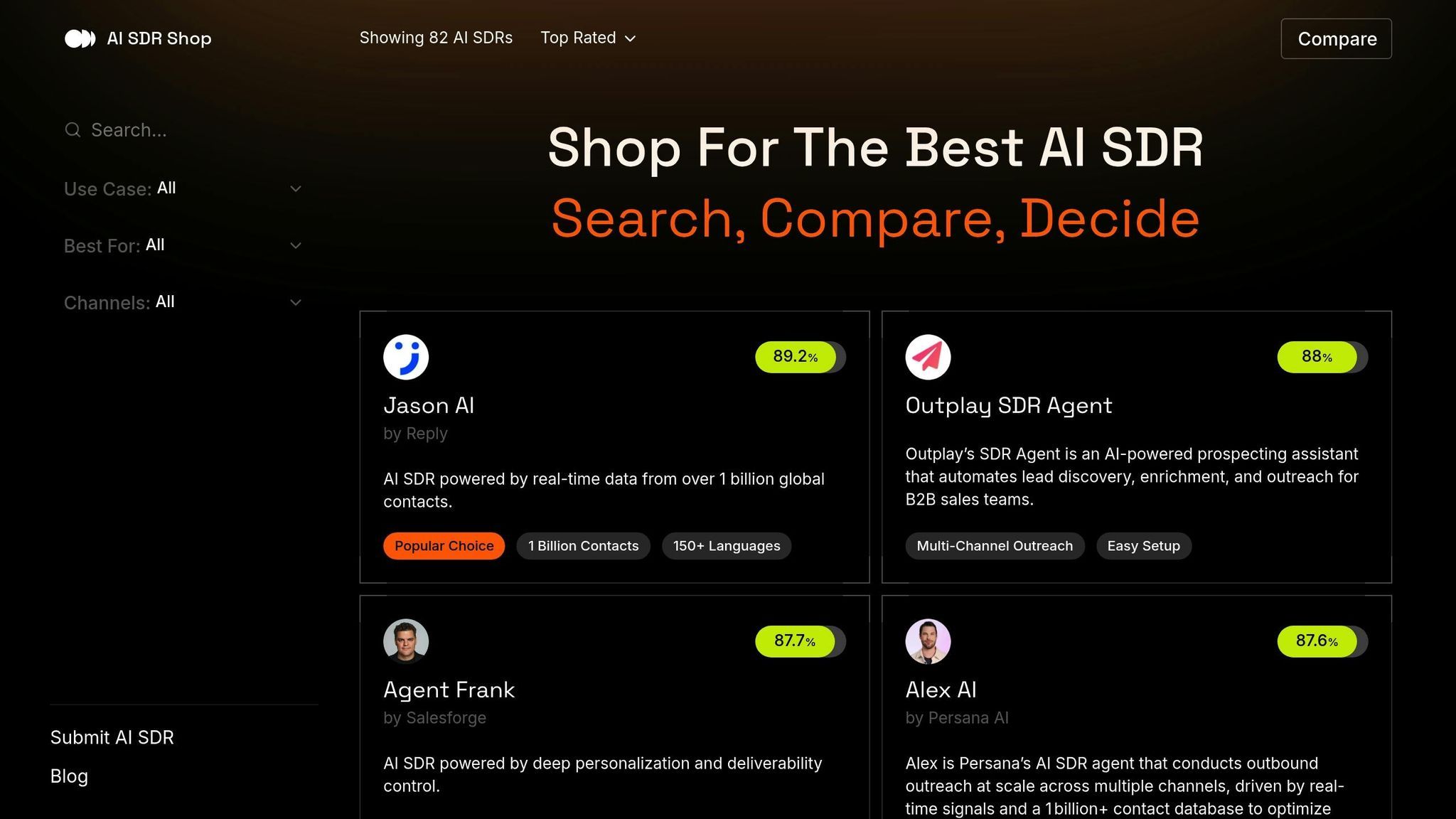
AI SDR Shop is a free directory that helps businesses explore and compare over 80 AI-powered Sales Development Representatives (SDRs). Each profile showcases key features like multi-channel outreach, real-time data integration, and proprietary email tools. This makes it easier to pinpoint which SDRs align best with your CRM and email personalization goals.
Many of the AI SDRs listed offer advanced features such as intent-based lead identification and customizable workflows. These tools can significantly improve the personalization of your emails. Plus, the platform includes human-led quality checks to ensure that AI-generated emails maintain professionalism while scaling your outreach efforts.
Next, let’s see how HubSpot CRM uses dynamic content to refine email personalization.
HubSpot CRM
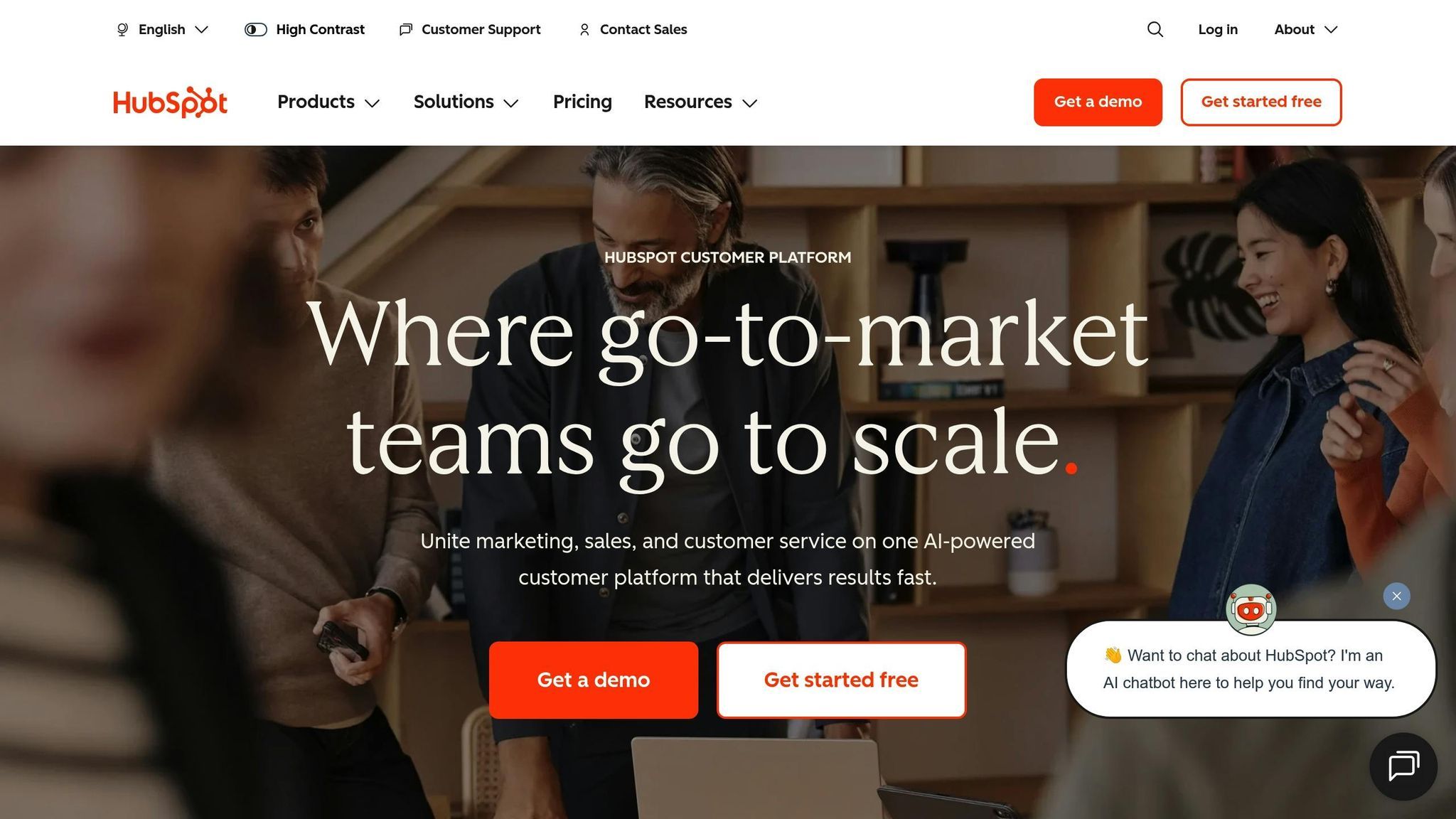
HubSpot CRM stands out with its dynamic content capabilities, which tailor email elements based on contact properties, behaviors, and lifecycle stages. Its smart content feature allows you to create one email template that displays different content blocks for specific audience segments.
The platform also uses behavioral triggers to send personalized follow-ups based on actions like website visits, email engagement, or deal stage updates. Pricing starts at $0 for the free tier, with paid plans beginning at $45/month. For advanced personalization tools like predictive lead scoring, the Marketing Hub Professional plan costs $890/month.
Salesforce
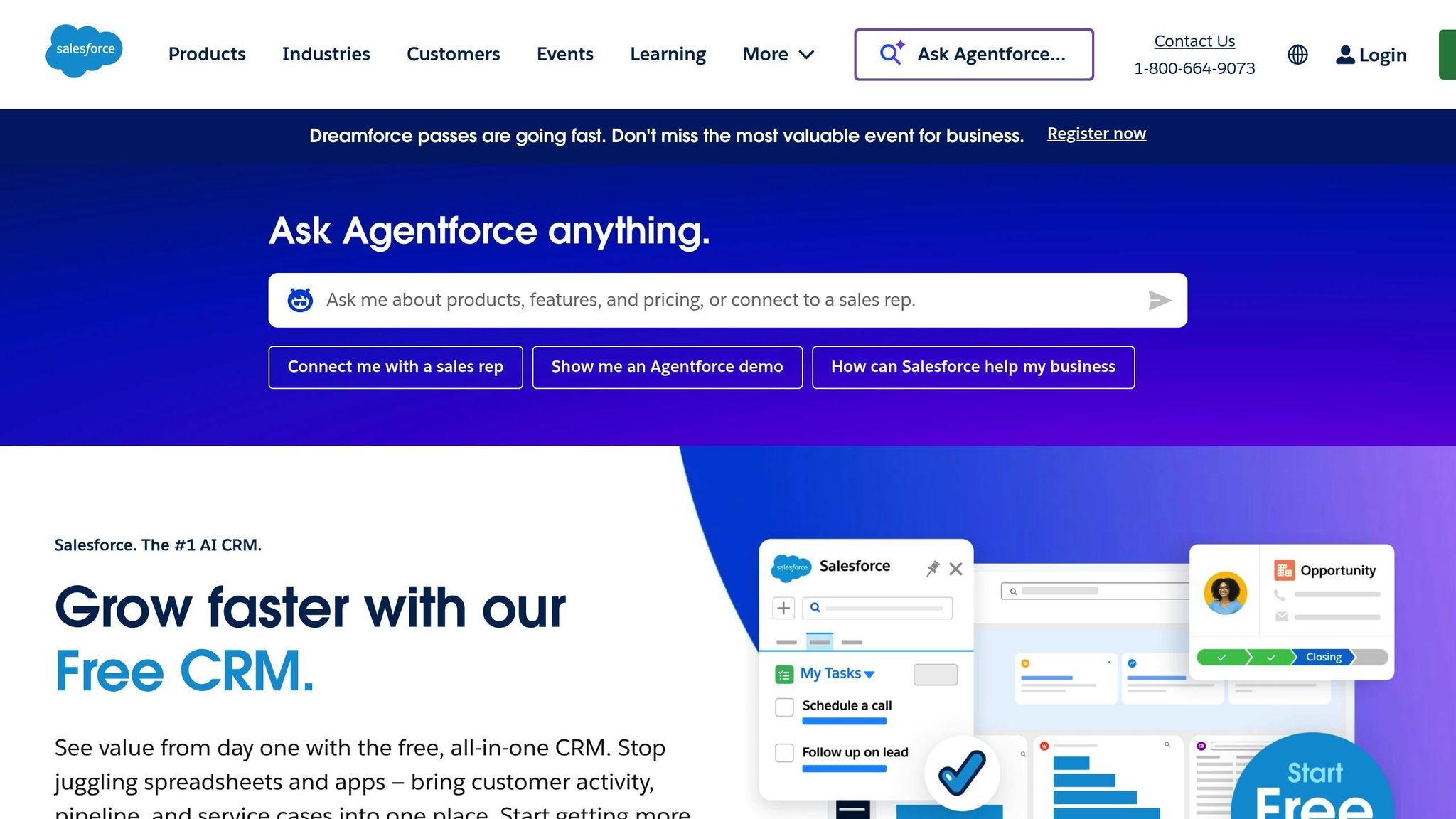
Salesforce, powered by Einstein AI, offers enterprise-level email personalization. Einstein Content Selection automatically tailors email content to each recipient by analyzing their interaction history and profile data.
With Salesforce's Journey Builder, you can create adaptive email workflows that respond to customer behaviors in real time. Features like Einstein Engagement Scoring suggest the best times to send emails, while Einstein Copy Insights helps optimize subject lines for better open rates. The Marketing Cloud starts at $1,250/month for up to 10,000 contacts, making it a strong choice for large organizations.
Microsoft Dynamics 365
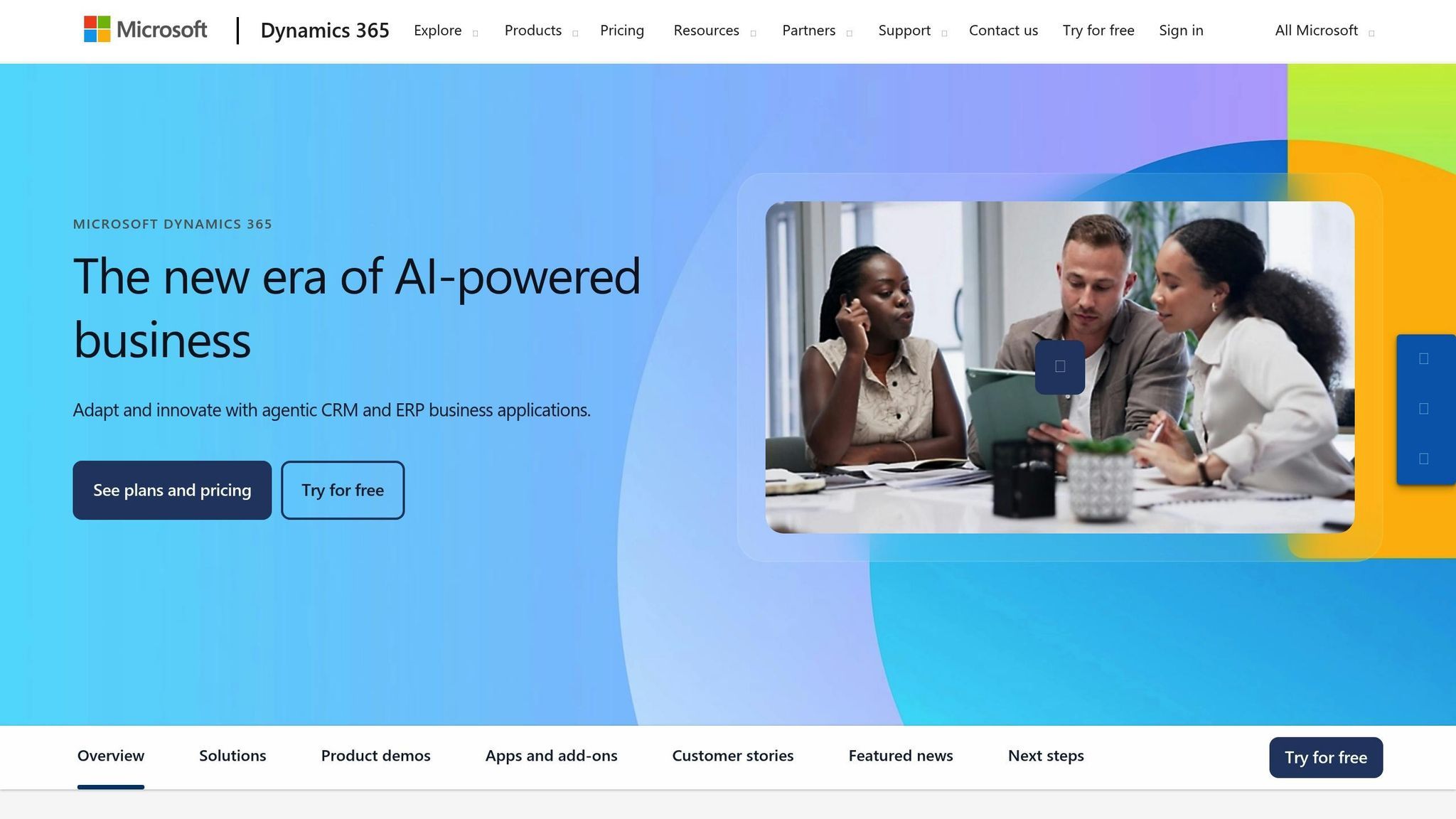
Microsoft Dynamics 365 integrates Copilot AI to streamline email workflows. Its real-time journey orchestration adjusts email content based on customer interactions across multiple channels.
The platform’s AI-driven lead scoring highlights the most engaged prospects and triggers personalized email sequences automatically. With seamless integration into Outlook, sales teams can access AI-generated email suggestions directly from their inbox. Pricing begins at $95/month per user for the Sales Professional plan, while the Customer Insights package costs $1,500/month for advanced personalization tools.
Zoho CRM
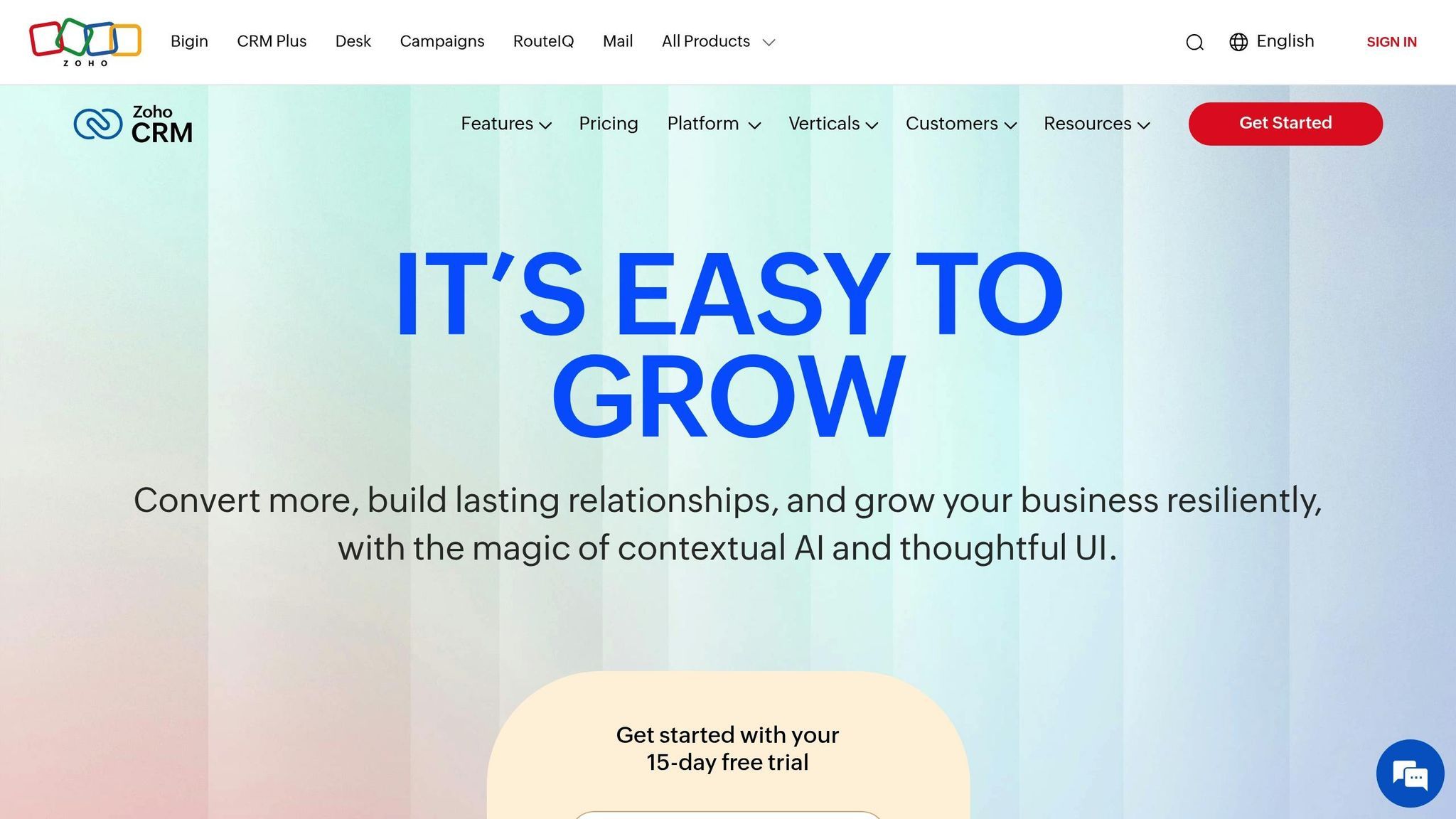
Zoho CRM leverages its Zia AI assistant to bring email personalization to small and mid-sized businesses. Zia analyzes communication patterns to recommend the best email timing and content. Additionally, its SalesSignals feature tracks customer behavior and triggers personalized campaigns when prospects show buying intent.
The Blueprint feature allows businesses to create tailored email workflows that adapt to deal progression and customer responses. Pricing starts at $14/month per user for the Standard plan, with the Enterprise plan available for $52/month per user.
Mailchimp
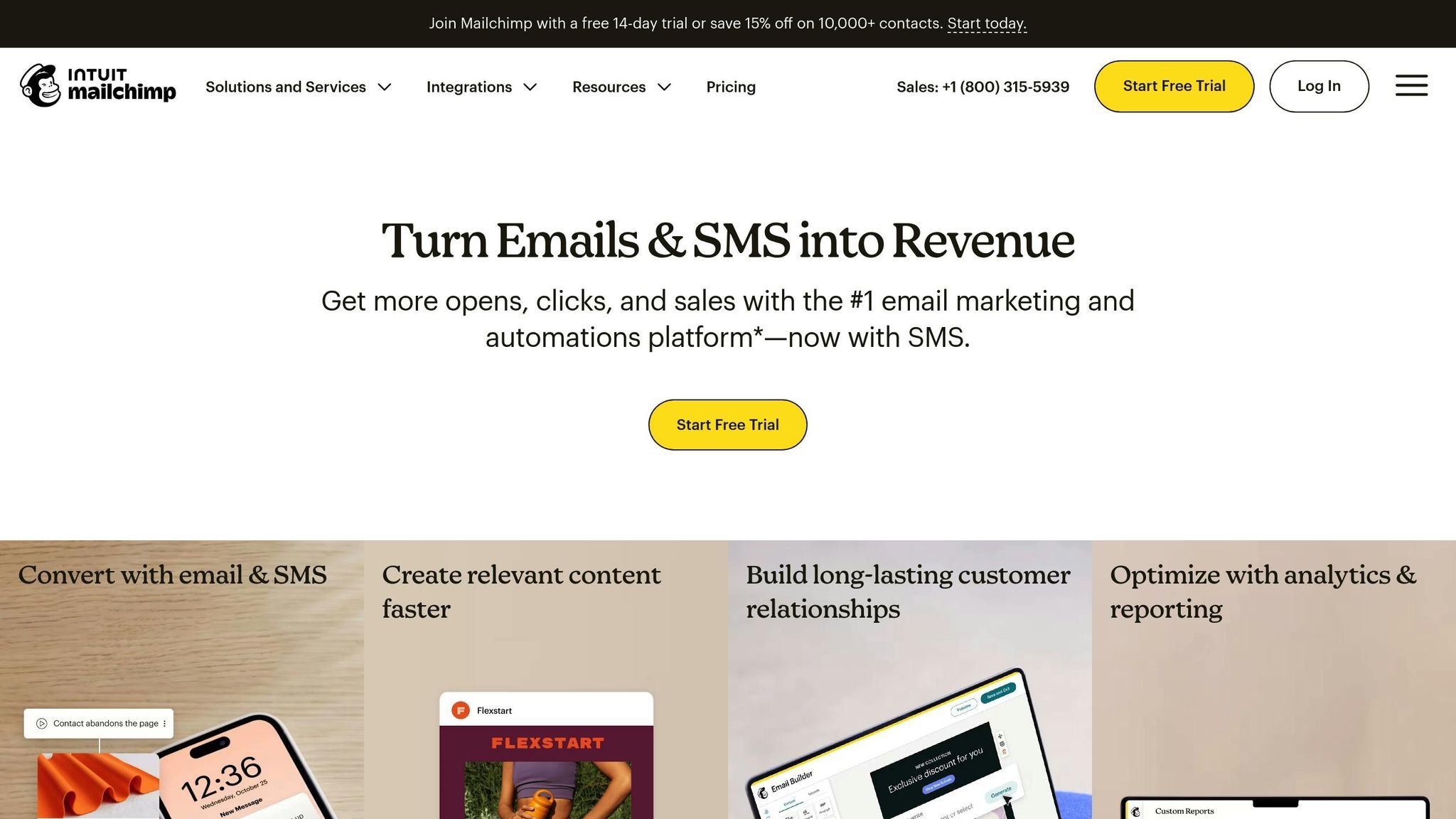
Mailchimp combines its CRM functionality with AI-powered tools tailored for e-commerce and content marketing. Its Customer Journey Builder creates personalized email sequences based on actions like purchases, browsing habits, and engagement.
The platform also includes a product recommendation engine that uses machine learning to suggest relevant items in email campaigns. Send time optimization ensures emails land in inboxes when recipients are most likely to engage. Plans start at $20/month for the Standard plan, with the Premium plan offering advanced features like multivariate testing for $350/month.
Pipedrive
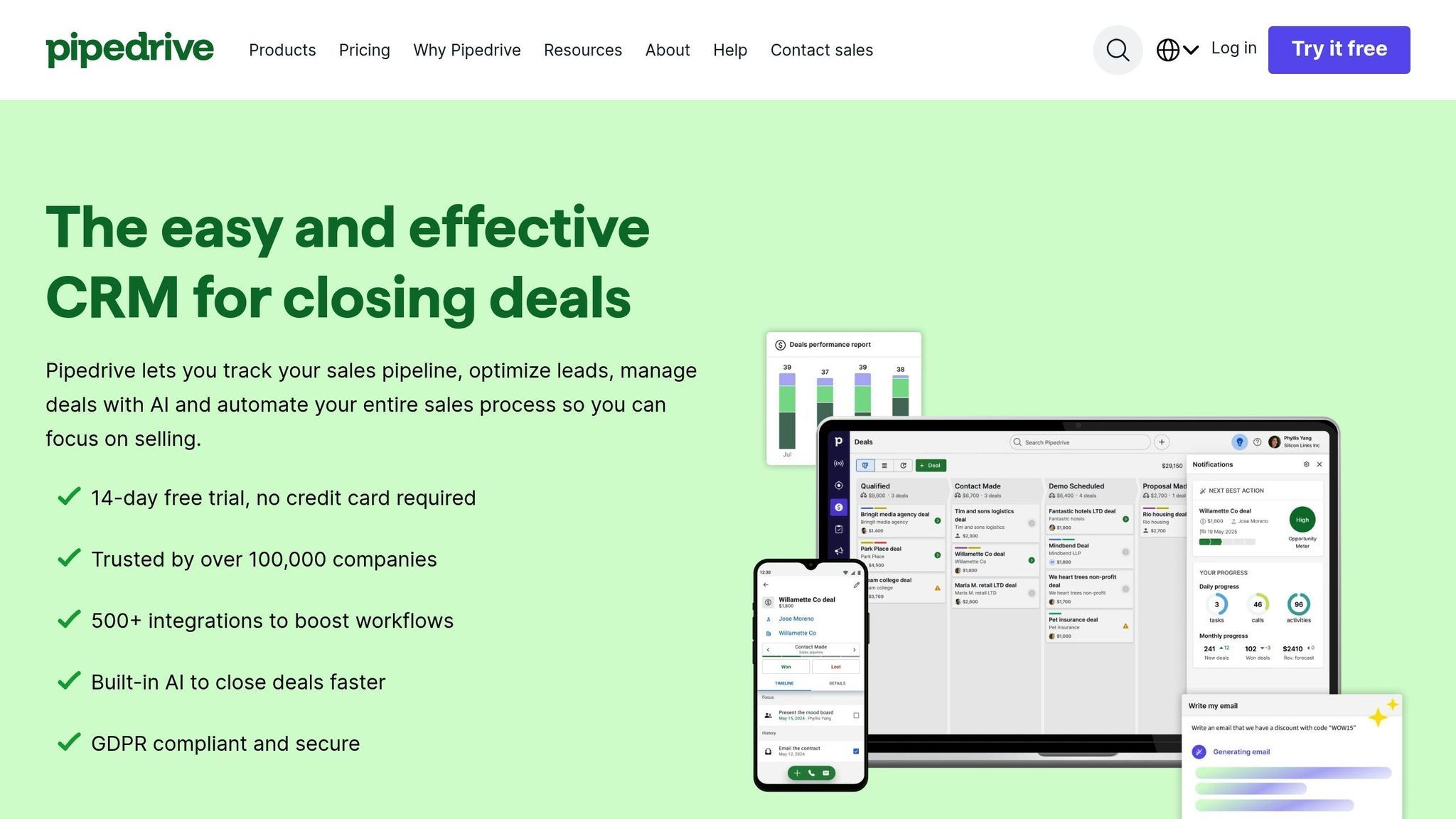
Pipedrive focuses on sales-centric email personalization through its AI Sales Assistant. The platform tracks email engagement in real time and updates deal probabilities based on recipient behavior.
Its email sync feature logs all interactions, ensuring complete visibility of customer communications. Workflow automation triggers personalized follow-ups based on deal stage changes or activity milestones. Pricing begins at $21.90/month per user for the Essential plan, with the Professional plan offering advanced automation at $56.90/month per user.
Harmonix AI
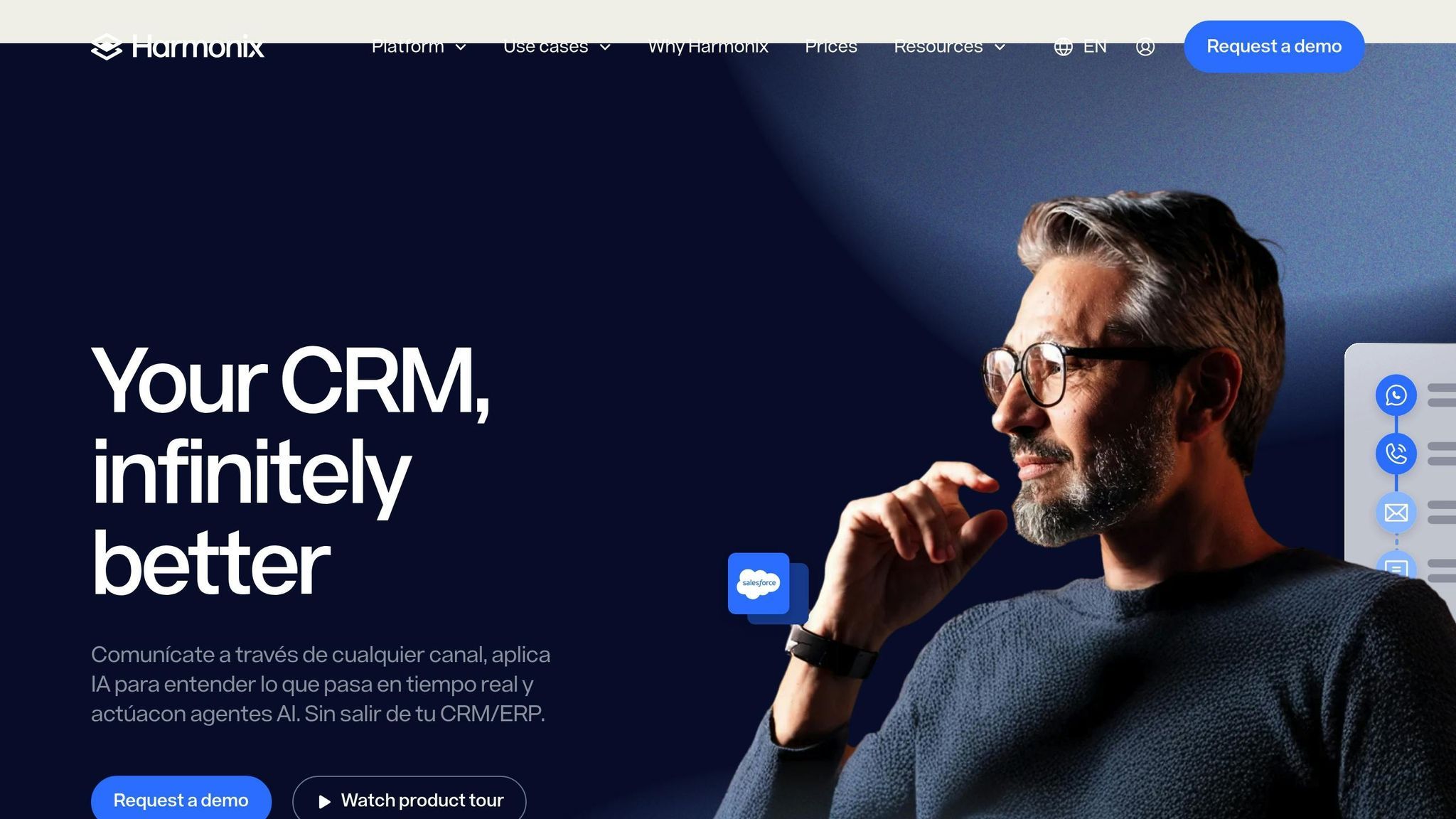
Harmonix AI acts as an enhancement layer for existing CRMs, adding advanced AI-driven email personalization without requiring a full system overhaul. Using natural language processing, Harmonix analyzes customer communications to generate personalized email content that aligns with your brand voice.
The platform’s real-time personalization engine adjusts email content based on the recipient’s position in the sales funnel and recent interactions. This is an excellent option for businesses looking to expand their CRM’s capabilities without replacing their current system.
sbb-itb-4c49dbd
CRM Integration Comparison
When evaluating CRM integrations, it's essential to compare key factors like AI features, scalability, and compatibility. Different businesses have unique needs, so the right CRM will depend on your organization's size and focus.
AI SDR Shop is a free directory designed to help businesses explore AI-powered sales tools. With over 80 AI SDR profiles and a human-led quality control process, it provides valuable insights into tools that could complement your CRM setup.
For small to mid-sized businesses, HubSpot CRM is a strong contender, offering a free tier with basic personalization features. Similarly, Zoho CRM stands out with its Zia AI assistant, which supports targeted campaigns - both options are great for organizations on a budget.
Larger enterprises often turn to Salesforce or Microsoft Dynamics 365. These platforms provide robust, enterprise-level capabilities, with Salesforce's Einstein AI and Microsoft Dynamics' seamless integration with other Microsoft tools.
E-commerce businesses may find Mailchimp particularly appealing due to its customer journey automation and machine learning-based product recommendations. Meanwhile, sales teams might prefer Pipedrive, which focuses on engagement tracking through its AI Sales Assistant. If you're looking to enhance an existing CRM, Harmonix AI offers tools like AI-powered content generation to boost your current system.
The table below highlights key AI features and the ideal audience for each platform, helping you align your choice with your specific needs and budget.
Comparison Table
| Platform | Key AI Features | Best Suited For | Notable Consideration |
|---|---|---|---|
| AI SDR Shop | Directory of 80+ AI SDRs, human-led quality control | Research and comparison | Free; functions as a directory, not a CRM |
| HubSpot CRM | Basic personalization options | Small to mid-size businesses | Has a free tier, with advanced features in paid plans |
| Salesforce | Einstein AI and predictive analytics | Large enterprises | Comprehensive enterprise-level AI capabilities |
| Microsoft Dynamics 365 | Integrated AI and real-time orchestration | Organizations using Microsoft tools | Excellent compatibility with Microsoft Office products |
| Zoho CRM | Zia AI assistant and SalesSignals | Budget-conscious small and mid-sized businesses | Affordable with essential features |
| Mailchimp | Product recommendations and send time optimization | E-commerce businesses | Focused on automating customer journeys |
| Pipedrive | AI Sales Assistant for engagement tracking | Sales-focused teams | Simple, effective personalization tools |
| Harmonix AI | NLP-powered content generation | Enhancing existing CRM systems | Designed for seamless integration with current CRMs |
Choosing the best CRM integration requires a close look at your organization's size, budget, and technological needs. Prioritize personalization, AI capabilities, and how well the platform integrates with your existing tools. For those starting their search, AI SDR Shop is a great resource to explore the options available.
How to Choose the Right CRM Integration
Choosing the right CRM integration for AI-driven email personalization is all about aligning your business needs with the platform's capabilities. Focus on practical features that directly support your goals rather than getting distracted by unnecessary bells and whistles.
Start by identifying your business objectives. For small to mid-sized businesses, platforms like HubSpot CRM and Zoho CRM offer straightforward solutions that simplify AI-powered personalization without overwhelming complexity. These tools are great for businesses looking to grow while keeping costs under control. On the other hand, larger enterprises often need the advanced functionality of Salesforce's Einstein AI or Microsoft Dynamics 365 to manage intricate customer data and sophisticated automation workflows.
In the U.S., compliance and security are non-negotiable. Your CRM must adhere to regulations like the CCPA and other state privacy laws. Look for platforms that include built-in compliance tools, data encryption, and audit trails. These features are particularly important when AI is handling sensitive personal data for email personalization.
Scalability is another critical factor. A CRM that works well for 100 contacts might struggle with 10,000. Consider how the platform handles growing data volumes, additional users, and expanding features. For example, Mailchimp is ideal for businesses focused on e-commerce growth, while Pipedrive is better suited for scaling sales teams.
Integration compatibility can make or break your choice. For instance, Microsoft Dynamics 365 works seamlessly with Microsoft Office, while businesses deeply invested in Google Workspace may find other CRMs more intuitive to adopt.
Finally, take advantage of available research tools. Resources like AI SDR Shop offer curated lists of AI SDR profiles to help you make an informed decision.
The key is to select a platform that not only solves your current email personalization challenges but also supports your future growth and operational needs.
FAQs
How can AI-powered CRM integrations improve email personalization for businesses of all sizes?
AI-powered CRM tools take email personalization to the next level by leveraging customer data to create tailored messages, fine-tune delivery times, and efficiently segment audiences. For small and medium-sized businesses, these tools simplify the process of connecting with customers on a personal level, enhancing satisfaction and driving sales. For larger companies, AI's ability to analyze massive amounts of data unlocks the potential for highly customized email campaigns that boost engagement and revenue. By delivering relevant and personalized email experiences, AI-driven CRM systems empower businesses of all sizes to strengthen customer relationships and achieve tangible outcomes.
How can businesses ensure data privacy and compliance when using AI-powered CRM integrations?
To protect data privacy and stay compliant when using AI-powered CRM integrations, businesses need to focus on strong data management practices. This means clearly defining who owns the data, obtaining explicit consent from users, and applying methods like anonymization or pseudonymization to protect sensitive details. It's also crucial for organizations to adhere to regulations like GDPR and CCPA. This can be achieved through regular security audits and the adoption of AI governance frameworks. These steps not only help track how data is used but also promote transparency and foster user trust. Additionally, providing ongoing staff training on data privacy best practices can further enhance compliance efforts.
How can businesses determine if a CRM integration can scale with their growing needs?
When planning for a CRM integration, it's crucial to pick a system that can handle growth effortlessly. Opt for platforms that can manage larger data volumes, accommodate more users, and support advanced features as your business expands. Prioritize those offering flexible integration options and reliable performance, even during peak usage. Keeping an eye on system performance is equally important. Regularly track metrics like data flow, user adoption rates, and error occurrences. This proactive approach helps you spot and address potential issues before they escalate. A well-chosen scalable solution will adapt to your business's current needs while being ready to support future growth without a hitch.